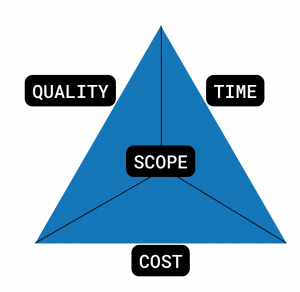Your Capstone Plan
4 Project Management
Why is Project Management important?
It provides the direction and organization for projects. It identifies what is included and excluded, resources needed and a scheduled plan.
What is a Project?
A Project is a temporary endeavour undertaken to create a unique product, service, or result. Subsequently, project management is then the application of knowledge, skills, tools, and techniques to project activities to meet the project requirements – as set out by the stakeholders. (Project Management Institute, 2021)
Project managers are organized, passionate, and goal-oriented individuals who understand what projects have in common, with a strategic role in how organizations succeed, learn and change.
Courses and Guided Projects
Coursera Introduction to Project Management This course is designed to give you the fundamentals of Project Management. You will learn the basic principles of Project Management by managing a fundraising event for your local farmers market. You will designate responsible team members to help you, build a timeline and see the different ways that you can manage the project. Together, we will walk through not only the documentation but also the theories and reasoning behind each task. You will learn how to look at a large project and break it down into manageable pieces and then how to build an action plan so that you hit your deadlines with your team (Megan Peck, Coursera).
How Do We Define Success in a Project?
Project success can be defined as the management of the project within the constraints set out by the stakeholders. If you can consider the 4 factors listed below and outline them for your project with agreement from the stakeholders you will be on your way to success.
- Scope: Document the scope of work to be delivered. To assist in defining the scope use documentation such as RFP, sales proposals, business requirements, functional specifications, etc. to set and limit the scope.
In-Scope is what the project will include meeting the requirements of the project goals

Out of Scope excludes responsibilities, activities, deliverables, or other areas that are not part of the project.
- Time: Time management involves assessing and developing a schedule and timeline for project completion.
- Quality: Quality involves determining policies, objectives and responsibilities so that the project will satisfy the needs for which it was undertaken. It is what the customer or stakeholder needs from the project deliverables.
- Cost: Cost allows creation, and approval, of the budget for the project in order to control spending. It requires, cost calculations, estimated resources required for the project, cost spreadsheets, etc.
Projects can be looked at in 5 phases:
- Initiation
- Project Planning
- Project Execution
- Project Monitoring
- Controlling
A stakeholder is an individual, group or organization who may affect, be affected by, or perceive itself to be affected by a decision, activity, or outcome of a project (Project Management Institute, 2021)
Organized, passionate, and goal-oriented individuals who understand what projects have in common, and their strategic role in how organizations succeed, learn and change.
Project constraints are limitations imposed on the project, like the budget, schedule, or resources. The PMBOK Guide recognizes six project constraints: scope, quality, schedule, budget, resources, and risk.
The extent of what a project will produce (product scope) and the work needed to produce it (project scope).

